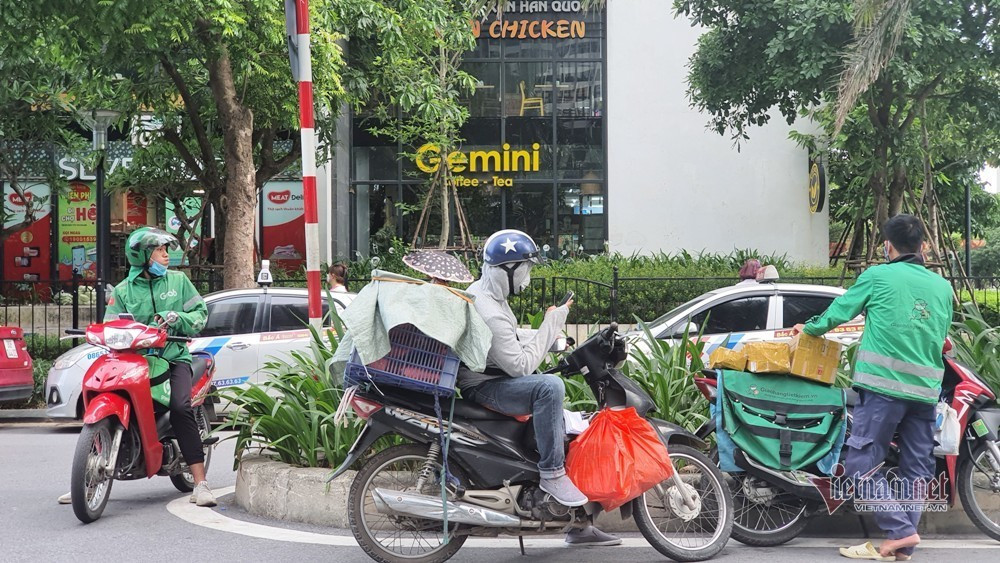
I met Nam again, a former accounting college graduate. Four years after graduation, Nam looked thinner, his skin darkened, no longer the scholarly student he once was.
Nam shared that over the past few years, he had taken on all sorts of jobs in Hanoi to make ends meet - working as a waiter in coffee shops, bars, and beer joints. The job he has stuck with the longest is as a ride-hailing driver.
His income from Grab is high enough to cover room rent, food, and support the family in his hometown. But after a prolonged illness, Nam’s health has declined, making it impossible to drive daily. On scorching days, resting at home means no income. To pay for rent, medicine, and living expenses, he sometimes has to borrow from friends and acquaintances.
Because he is a freelancer, he doesn’t have health insurance and unemployment insurance like those who work under a labor contract and participate in social insurance.
Nam said he once had a job offer from a company which promised to sign a labor contract with him. However, the offered salary was too low, just VND6 million. He decided to work as a Grab ride-hailing driver, which could bring higher income.
Only when illness and unemployment strike does Nam realize how precarious freelancing is.
“Freelancers don’t have social insurance, health insurance, and unemployment insurance, so when we’re sick or out of work, we’re in dire straits with no support,” Nam said.
Nam’s story is common in bustling cities like Hanoi, HCM City, and other major urban areas, where countless freelancers work without contracts, benefits, or a safety net when they lose their jobs or fall ill.
According to the General Statistics Office, in 2024, Vietnam had about 33 million freelancers (out of 52 million total workers), accounting for over 65 percent of the workforce. Yet 43.9 percent of informal workers are classified as vulnerable. Alarmingly, 97.9 percent of informal workers don’t have social insurance which means no health and unemployment insurance.
The situation underscores the urgent need for a more flexible and inclusive social security system for this large workforce.
Regulations needed to ensure freelancers’ social security
Vietnam’s labor market is rapidly shifting toward flexibility and digitalization, with a growing number of workers freelancing on tech platforms, seasonally, or part-time, without any legal ties to employers.
Most of these workers don’t have labor contracts, meaning they cannot access social, health and unemployment insurance, the key pillars of the social security system.
It’s time to institutionalize regulations mandating businesses, organizations, and especially tech platforms to sign labor contracts (even flexible ones) with long-term, regular workers.
Only when workers sign labor contracts with employers will they have a basis for social insurance policy, their rights and obligations be clarified, and their rights in the evolving job market be better protected.
The Labor Code doesn’t prohibit flexible labor contracts. The problem is creating a clear, robust legal framework to ensure no one is left behind in the digital transformation and platform economy, where workers are increasingly central to development.
Vietnam can learn from developed countries like France, Germany, and Sweden, which have social security policies for freelancers, such as voluntary unemployment insurance or subsidized contributions to expand insurance coverage.
For example, Germany’s unemployment insurance system operates on two clear tiers, covering both formal and vulnerable workers, including freelancers and short-term contractors.
The first tier (ALG I) provides benefits for workers with at least 12 months of contributions in the 32 months prior to unemployment. Benefits range from 60 to 67 percent of net income, lasting 6 to 24 months based on age and work duration.
The second tier (Bürgergeld, formerly ALG II) offers basic support for long-term unemployed individuals or those ineligible for ALG I, including freelancers. Bürgergeld ensures a basic living standard and facilitates re-entry into the labor market.
In Vietnam, the newly amended Employment Law has significantly expanded unemployment insurance policy coverage, aiming to include flexible and freelance workers, a growing force in the digital economy.
Under the law, workers with fixed-term contracts of one month or more (down from three months) and part-time workers earning at least the minimum mandatory social insurance contribution base are eligible for unemployment insurance. This aligns with the 2024 Social Insurance Law and gradually extends the safety net to those outside the formal sector.
To bring the law to life, organizations and businesses regularly employing freelancers must be obligated to sign labor contracts (even flexible ones) and fulfill social insurance and unemployment insurance contributions, just as they do for formal workers. This is a crucial step to prevent “legal loopholes” that evade insurance obligations while ensuring workers’ rights in an increasingly non-traditional job market.
Vu Diep